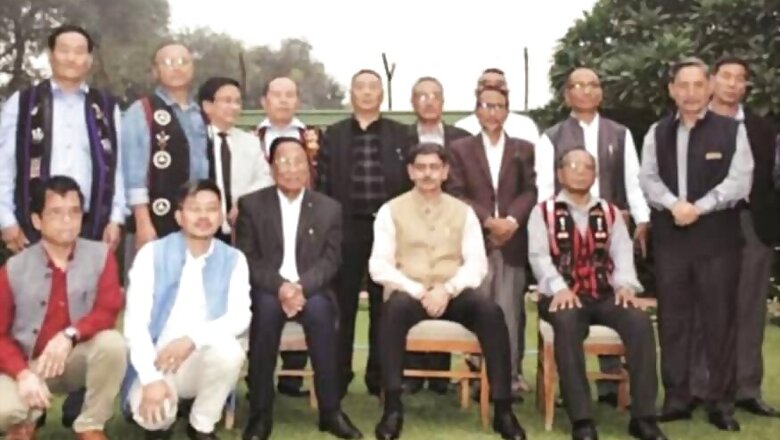
views
Interlocutors engaged by the government in the talks with militant outfits have usually not been able to last till the exercise gets translated into an agreement. An interplay of many factors has ensured their frequent removal which is also a reason for the inordinate delays in the peace processes.
Interlocutors are facilitators who are supposed to prepare the ground for a negotiated settlement between the rebel group and the government. The process goes through many steps beginning from the feelers that the groups deliver expressing a wish for talks, ceasefire or suspension of operations, submission of demands, negotiations and finally the agreement.
However, all peace processes are unique with their own traits which also determine the duration of the talks and final outcome of the exercise. On many occasions, glitches surfaced unexpectedly after the ceasefire that had almost brought the peace process to the brink of collapse.
While the negotiation with groups such as the Bodoland Liberation Tigers (BLT) and Tribal National Volunteers had been simpler and less time-consuming, the process with the Mizo National Front (MNF) had stretched for many years with intervals.
A lesser-known episode occurred in 2005 in Assam’s Karbi Anglong district when local police bombarded a designated camp of the Dima Halam Daogah (DHD) with mortars following its suspected involvement in attacks against the majority Karbis in the hill district. The accord with DHD was delayed and clinched years later in 2012.
Among other reasons, the continuation of the process depends upon the role of the interlocutor who must enjoy the confidence of the rebel groups and the government. Confidence-building takes time and hasty transfers hardly help in achieving the goal.
An evaluation of the peace process with NSCN(IM) and the pro-talks ULFA reveals that the continuity had been ruptured due to two factors in the past. Four interlocutors had so far been appointed for the talks with the Naga group(s) and three with the ULFA faction.
Continuity Depends Upon Right Equations
Former intelligence chiefs and secretaries had usually been preferred for the post of interlocutors in the past. Swaraj Kaushal, who was the first to be appointed to the post with the NSCN(IM), was an exception. Then, there were two occasions earlier when politicians were roped in for the spadework with the Nagas — the peace mission in Nagaland in the mid-1960s which also included a foreign missionary Rev Michael Scot in the committee, and the group of ministers headed by Oscar Fernandes during the first UPA regime (2004-09). The efforts floundered without achieving any result.
Appointment of former government officials depends upon their capacity to lobby for a post- retirement engagement with the ruling party. This could sometimes stretch to ridiculous limits with the result that the officials get identified with the political parties. So when another party is voted to power, the interlocutors could be shown the door.
In the past, there have been instances of interlocutors being removed abruptly for other roles. Former petroleum and natural gas secretary RS Pandey was allowed to resign from the post by the ruling BJP and allowed to contest from an assembly seat in Bihar which he won.
Tussle with MHA
Not having the right equations with the ministry of home affairs (MHA) could be as hazardous which was best evidenced in the case of former special secretary of the Research & Analysis Wing (R&AW) AB Mathur. Mathur had stepped in as the interlocutor with the pro-talks ULFA early in 2018 after Dineshwar Sharma was transferred as the administrator of Lakshadweep.
Mathur has not been able to get along with the MHA for a variety of reasons, so much so that the peace process and agreement with the National Democratic Front of Boroland (NDFB) in Assam last January was totally managed by the ministry which began with facilitating the arrival of the anti-talks faction from Myanmar.
“Another hassle is the indecisiveness of the ministry (MHA). It is very difficult to continue the talks with the groups when nothing has moved forward,” said an interlocutor who did not wish to be named. “It gives the impression that the interlocutor is not bothered about the outcome of the talks but only to retain the position indefinitely.”
The direct access that interlocutors sometimes have to the Prime Minister’s Office (PMO) is not preferred by the MHA. It does not like to be kept in the dark over any matter related to internal security of the country.
It may be recalled that after the exit of RS Pandey, the PMO had overruled the recommendation of the MHA and appointed former chairman of joint intelligence committee (JIC) RN Ravi as the interlocutor for the Naga peace talks. The ministry had pitched for Ajit Lal who had retired as chairman of JIC in July 2014 as the interlocutor.
Certainly, the ministry wouldn’t be unhappy with the recent controversies over the role of RN Ravi in the Naga peace process and the role assigned to the Intelligence Bureau (IB) to bring the process to a logical conclusion at the earliest.
‘Where Is The Need For Interlocutors?’
K Padmanabhaiah, former home secretary and the second interlocutor with the NSCN(IM), makes a case for the elimination of the post of interlocutor in the peace process with militant outfits. He is of the opinion that the home secretary must engage the group directly for a faster resolution of the conflicts.
Padmanabhaiah recalled that he had to report to five home secretaries during the period when he was the interlocutor. And all of them, he explained, had a different view about the conflict in Nagaland. “Moreover, none of them was prepared to take the responsibility to push for an agreement. Another problem is that the interlocutor gets branded as a sympathiser of the rebel group the moment he explains that there is merit in some of their demands.”
The former home secretary also pins the blame on the long and cumbersome procedure that peace processes have to go through before reaching the stage of an agreement. He feels that the interlocutor must have direct access to the Prime Minister and who should be bold enough to arrive at “out-of-the-box solutions” to break the impasse.
Padmanabhaiah reminded that the stalemate in the peace talks with the NSCN(IM) has continued since the time he handed over charge to his successor. “There is nothing new in the framework agreement of 2015 which we did not achieve. But unlike what I faced, Ravi had direct access to the national security adviser (NSA) and to the PM to some extent,” he claimed.














Comments
0 comment